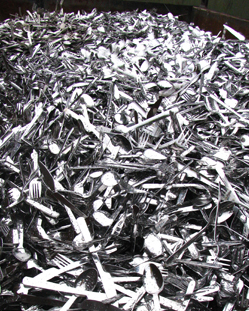Program 1: (UQ and Swinburne)
Focus: Identify key issues of recycling of metal in an Australian and global context
Objectives:
- Identify the most favourable systems for recycling and industrial ecology within an Australian context and with the potential to be adopted in countries outside Australia;
- Systematically articulate the barriers, enablers and policy options for favourable systems for recycling and industrial ecology that will facilitate the exploitation of metals and alloys in end of life products; and
- Identify metals and alloys and the appropriate processes that have the potential to deliver the greatest value from recycling.
Data needs / points for collaboration:
- Data, information and/or reports (at local, state or national levels) on metal scrap generation, collection, separation, shipments overseas, and domestic recycling
- Information on economic incentives to increase uptake of recycling
- Legislative and regulatory requirements that can affect recycling uptake
- Potential candidate/s for high value-add recycling pilot project
- Insights of challenges from companies perspectives, e.g. economic values, technical aspects, etc.
Contact:
- Dr Glen Corder: 07 3346 4136; g.corder@smi.uq.edu.au
- Assoc. Prof M Akbar Rhamdhani: 03 9214 8528; ARhamdhani@swin.edu.au
Program 2: (Monash and Yale)
Focus: Examine aspects of the collection of recycled materials, their character and spatiality in Australia – identifying social, economic and logistical challenges
Objectives:
- Characterise, map and evaluate the existing resource of materials available for recycling in Australia – focus on case study product types (computers & TVs, mobile phones, hand held batteries) and metal types – zinc and copper
- Review existing systems for collection and identify strategies for improving their effectiveness;
- Assess the diversity and quantity of companion metals in Australian ore deposits by establishing current levels of mining of major metals and their by-product metals within Australia, and Australian reserve and reserve base estimates for major metals and their by-product metals;
- Estimate the current outflows of metals in products discarded in Australia to estimate current and future outflows of metals in discarded products;
- Create scenarios for the study of possible future evolution of metal supply and demand within Australia and elsewhere to anticipate possible future outflows of recyclable metals in discarded products; and
- Use present and future material flow assessments in theoretical LCA scenario modelling for different collection, processing and socio-technical systems.
Data needs / points for collaboration:
- Updated proxy data for steel, zinc and copper in buildings and infrastructure
- Data on commercial buildings and commercial motor vehicles
- Data on existing collection systems and recovery facilities (except landfill data that we already have)
- Summary data on businesses involved in recycling industry
- Data on outflows of metals in discarded products
- Metal contents in used mobile phones
- The estimated volume of mobile phones estimated at POA level
- The estimated volume of mobile phones estimated at POA level
- The estimated volume of hand held batteries estimated at POA level
- Models for estimating end-of-life stocks
- Import and export data for case study product types and metal types.
Contact:
- Dr Ruth Lane: 03 9905 2937; ruth.lane@monash.edu
- Prof Thomas Graedel thomas.graedel@yale.edu, and Dr Barbara Reck barbara.reck@yale.edu
Program 3: UTS
Focus: Characterise and test innovative business models, which can capture the value of this untapped resource, and characterise the emergent metals recycling industry options for Australian firms.
Objectives:
- The creation of business model typologies driven by increased resource efficiency demand – these typologies will detail characteristics such as revenue, investment, innovation and corporate strategy in identifying value in recycled materials, developing capacity (knowledge and technology) to enable increased resource efficiency, and supply chain and logistics systems that enable revenue generation;
- Understanding of the characteristics of current and potential materials recycling industry in Australia, and in a global context, and a description of the business models most suited to the Australian industry; and
- Analysis of the implications of industrial development of metals recycling and downstream activities in terms of turnover ($), jobs, skills (gaps and training implications) of different scenarios of market development for metals recycling in Australia.
Data needs / points for collaboration:
- Identification of relevant business models, supply chains and collaboration case studies both domestically and internationally and key contact within relevant organisations.
- For businesses – participation in an industry survey in 2015.
Contact:
- A/Prof Damien Giurco: 02 9514 4978 Damien.Giurco@uts.edu.au
- Dr Samantha Sharpe: 02 9514 4169 Samantha.Sharpe@uts.edu.au
Program 4: UTS
Focus: Identify transition pathways that can be pursued to ensure that Australia can generate wealth from waste (builds on outputs of the other programs)
Objectives:
- Develop and test potential transition pathways for a usefully representative urban system (this will be done through a fore sighting case study); and
- Produce a compendium report on determinants, conditions and parameters that are most likely to support a significantly increased capacity for local recycling in Australia.
Data needs / points for collaboration:
- Please register your interest to participate in a fore sighting case study at: https://www.surveymonkey.com/s/wealthfromwaste_general_registration
Contact:
- Dr Nick Florin: 02 9514 4797 Nick.Florin@uts.edu.au
- Prof Stuart White: 02 9514 4944 Stuart.White@uts.edu.au



